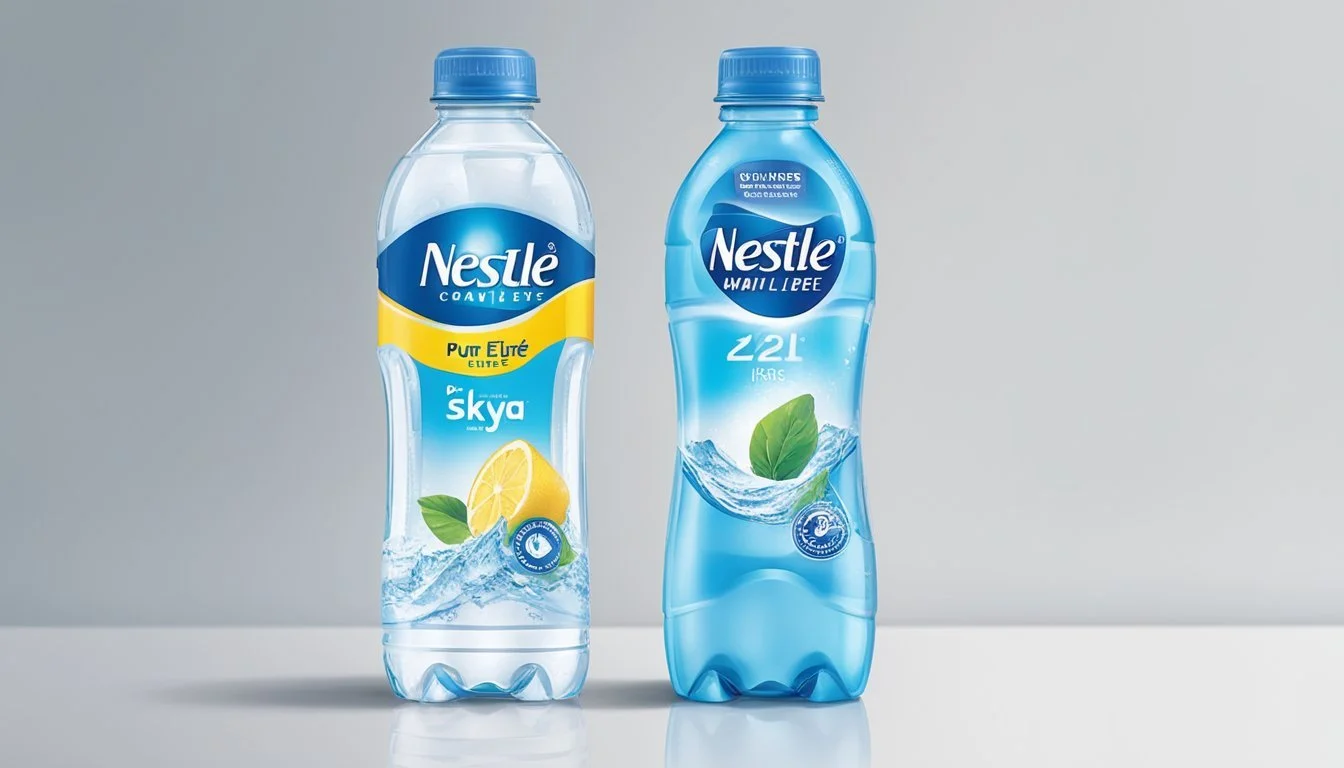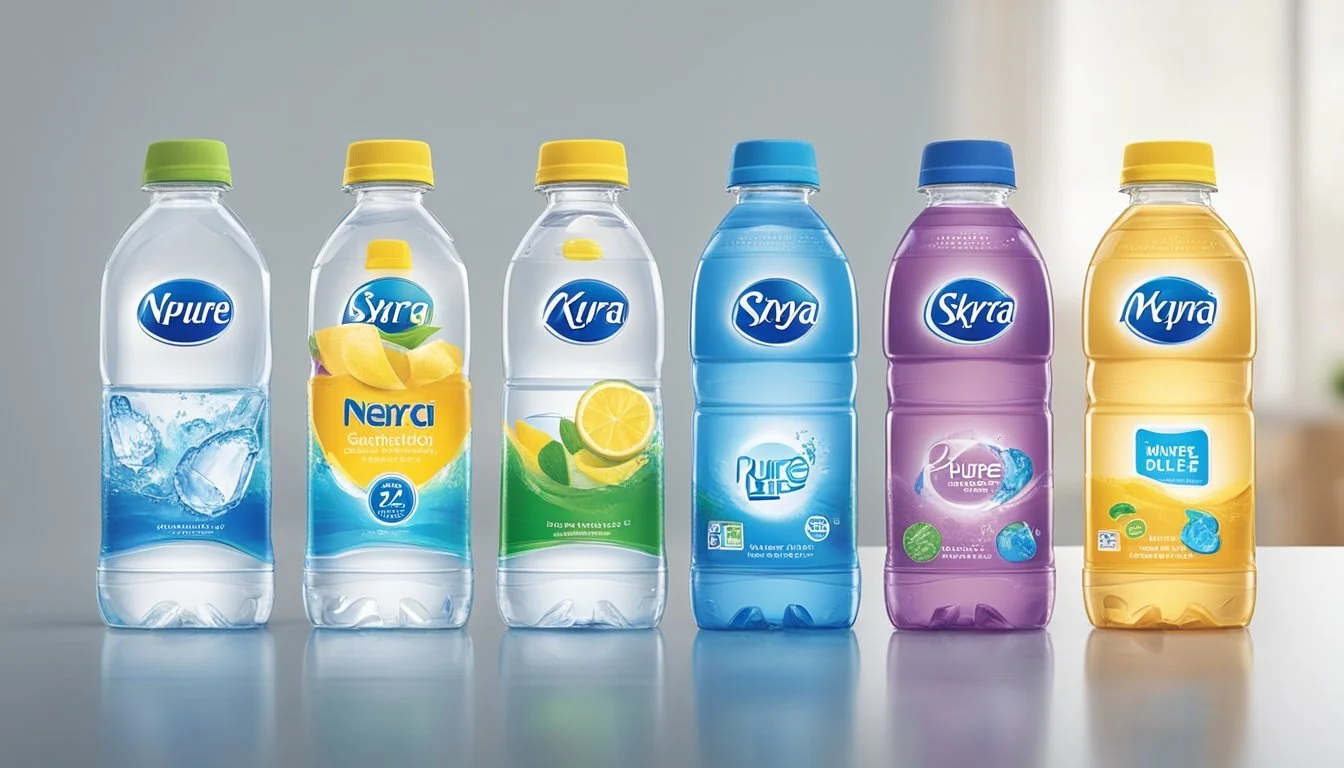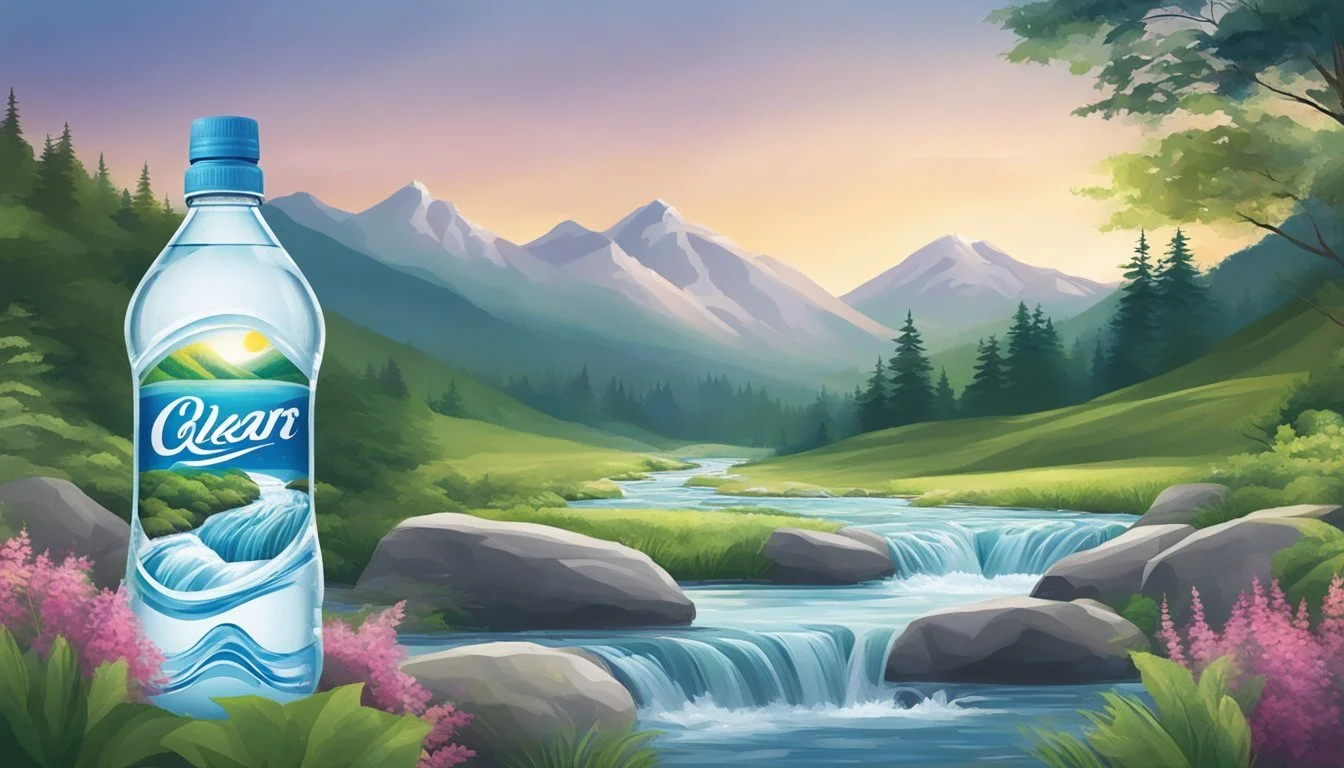Nestlé Pure Life vs. Skyra
A Comprehensive Comparison of Bottled Waters
The debate between Nestlé Pure Life and Skyra bottled water captivates many looking for the best hydration option. Nestlé Pure Life is known for its widespread availability and affordability, making it a go-to choice for many consumers. Skyra, on the other hand, prides itself on naturally alkaline water sourced from Iceland, offering a premium experience.
Consumers often question which water brand tops the other on quality and taste. Skyra stands out for its unique sourcing and natural alkalinity, providing a refreshing and crisp taste that sets it apart from the more common Nestlé Pure Life. Both have their own merits, but when it comes to premium quality, Skyra might just have the edge.
Understanding the differences in taste and quality can help readers make an informed choice. Whether seeking everyday hydration or a more luxurious experience, each brand offers distinct advantages worth exploring.
Overview of Bottled Water Industry
The bottled water market encompasses a wide variety of types and brands, each offering distinct characteristics and benefits. This includes insights into different types of bottled water and a closer look at key players in the industry.
Understanding Bottled Water Types
Bottled water types are primarily categorized by their source and processing methods. Spring water comes from underground formations, requiring natural filtration before bottling. Purified water, including brands like Dasani and Aquafina, undergoes extensive filtration to remove impurities.
Mineral water such as Fiji and Evian, is rich in minerals sourced naturally from springs. Artesian water, such as Voss, originates from confined aquifers, providing a unique mineral composition. Alkaline water like Essentia, is known for its higher pH level, which is believed to have health benefits.
Key Brands in the Market
The bottled water market includes numerous well-known brands, each with its distinct qualities. Nestlé Pure Life, known for affordability and widespread availability, often offers purified water in larger quantities.
Skyra, sourced from natural springs in Iceland, positions itself as a premium option with a focus on purity and a fresh taste. Other major names include Poland Spring, Ice Mountain, Core Hydration, and Mountain Valley Spring Water, all with unique selling points.
Brands like Voss, Evian, and Fiji emphasize luxury and superior quality, often found in premium price segments. Eco-friendly options such as Pathwater focus on sustainability with reusable packaging.
Health and Hydration
When comparing Nestlé Pure Life and Skyra, it's essential to look at their nutritional profiles, mineral content, and the benefits of proper hydration to understand their impact on health.
Nutritional Profile and Mineral Content
Nestlé Pure Life is purified water, often sourced from public water supplies and then treated with reverse osmosis to remove impurities. It typically contains added minerals like calcium chloride, sodium bicarbonate, and magnesium sulfate to enhance taste. This makes it a reliable option for basic hydration needs.
Skyra, on the other hand, sources its water from natural springs in Iceland. It boasts a higher mineral content, including naturally occurring calcium, magnesium, and silica. These minerals contribute not only to hydration but also to the body's electrolyte balance, which can be particularly beneficial for physical health.
Comparison Table:
Brand Source Key Minerals Process Nestlé Pure Life Purified Water Calcium, Sodium, Magnesium Reverse Osmosis Skyra Natural Spring Water Calcium, Magnesium, Silica Natural Filtration
Health Benefits of Proper Hydration
Proper hydration is crucial for maintaining bodily functions. Both Nestlé Pure Life and Skyra aim to provide clean and safe water that supports hydration. Nestlé Pure Life's purified water ensures that contaminants are removed, making it a safe and accessible option for everyday use.
Skyra's natural spring water, enriched with essential minerals, not only hydrates but also supports bone health, muscle function, and skin health due to its mineral content. Drinking water with a higher mineral content, like Skyra, can be advantageous for those looking to supplement their diet with additional nutrients naturally.
Both brands cater to different preferences and needs, with one prioritizing purity and added minerals, and the other focusing on the benefits of natural mineral content.
Comparing Nestlé Pure Life and Skyra
This section compares Nestlé Pure Life and Skyra bottled waters on various aspects including brand reputation, taste, water source, processing methods, and pricing.
Brand Reputation and Consumer Insights
Nestlé Pure Life is a well-established brand under the global conglomerate Nestlé. It is recognized for its ubiquitous presence and consistent quality. Consumer insights often highlight its trustworthiness and widespread availability.
Skyra, while not as widely recognized, is praised for its commitment to purity and natural sources. It appeals to a niche market that values natural and premium water sources over mass-market products.
Key Insights:
Nestlé is recognized for reliability and availability.
Skyra focuses on purity and niche marketing.
Taste and Quality Comparison
Consumers often differentiate between bottled waters based on taste. Nestlé Pure Life is known for its neutral taste, achieved through reverse osmosis and mineral addition. Feedback is mixed; some find it refreshing, while others consider it bland.
Skyra water is noted for a more natural taste profile, sourced from Icelandic springs. It has a slightly higher pH level, which some consumers find more pleasant and smooth.
Key Insights:
Nestlé: Neutral, consistent taste.
Skyra: Natural, smooth taste with higher pH.
Water Source and Purity Analysis
Nestlé Pure Life sources its water from both municipal supplies and well sources. It undergoes extensive purification, including reverse osmosis, to ensure safety and quality.
Skyra sources its water from pristine Icelandic springs. This natural filtration process minimizes the presence of contaminants and provides naturally high purity levels.
Key Insights:
Nestlé: Multiple sources, extensive filtration.
Skyra: Natural spring, minimal contamination.
Processing Methods and Quality Assurance
Nestlé Pure Life employs rigorous purification processes, adhering to FDA and EPA standards. Techniques include reverse osmosis, microfiltration, and UV treatment, ensuring the removal of any contaminants.
Skyra places emphasis on minimal processing to maintain the natural integrity of the spring water. Quality assurance is maintained through natural filtration and regular safety checks.
Key Insights:
Nestlé: Advanced filtration, strict standards.
Skyra: Minimal processing, natural filtration.
Pricing and Convenience Factors
Nestlé Pure Life is competitively priced, making it accessible to a broad consumer base. Its availability in various retailers and convenience stores adds to its appeal. The use of plastic bottles is common, with options for larger volumes and multipacks.
Skyra, being a premium brand, is priced higher. Distribution is limited compared to Nestlé, often found in specialized stores or online. The packaging often reflects its premium nature, sometimes using recyclable or eco-friendly materials.
Key Insights:
Nestlé: Affordable, widely available.
Skyra: Premium pricing, limited distribution.
Environmental Impact and Sustainability
Nestlé Pure Life and Skyra adopt different approaches to manage their environmental footprint, particularly in the areas of plastic waste, recycling initiatives, and the overall sustainability of their bottling processes.
Bottling Process and Plastic Waste
Nestlé Pure Life and Skyra primarily use plastic bottles to package their water. This packaging choice has significant implications for the environment. Plastic bottles contribute to a substantial amount of waste if not properly managed.
Efforts to reduce the amount of plastic used in each bottle have been made by both brands. Nestlé Pure Life, for example, aims to minimize plastic usage by designing lightweight bottles. Skyra is also exploring the use of more sustainable packaging materials.
Recycling Initiatives and Eco-Friendly Practices
Recycling initiatives are a crucial part of both brands' strategies. Nestlé Pure Life is working on developing a circular economy for recycling and reusing PET bottles. Efforts include partnerships with other companies and public authorities to enhance recycling rates.
Skyra emphasizes the use of recycled materials in their bottle production. By integrating a higher percentage of recycled plastic, they aim to reduce their reliance on virgin materials. Both brands promote consumer awareness about the importance of recycling to minimize environmental impact.
Assessing the Environmental Footprint
The environmental footprint of these bottled water brands encompasses water usage and waste management. Nestlé Pure Life requires less than 2.5 liters of water to produce one liter of bottled water. They highlight this efficiency as part of their sustainability efforts.
Skyra, while focusing on minimal resource use, also strives to lessen the overall environmental impact by adopting more eco-friendly practices in their operations. Both brands face challenges in ensuring that their plastic waste is recycled rather than ending up in landfills or the ocean. Achieving sustainability in bottled water production remains a significant goal for both companies.
Regulations and Safety Standards
Regulations and safety standards play a crucial role in ensuring that bottled water, like Nestlé Pure Life and Skyra, meets health and safety criteria. This involves adherence to FDA regulations, identifying potential contaminants, and rigorous water testing and certification.
FDA Regulations and Compliance
The Food and Drug Administration (FDA) regulates bottled water as a packaged food product. Both Nestlé Pure Life and Skyra must comply with FDA standards, which cover labeling, contaminant limits, and good manufacturing practices.
FDA regulations ensure that bottled water companies monitor and manage contaminants such as lead, arsenic, and other heavy metals.
The FDA mandates frequent water testing to verify compliance with these safety standards. Bottled water must also comply with the Environmental Protection Agency (EPA) standards for tap water, ensuring parallel safety and quality for consumers.
Identifying Potential Contaminants
Potential contaminants in bottled water include PFAS chemicals (per- and polyfluoroalkyl substances), heavy metals like lead and arsenic, and other pollutants such as solvents and fertilizers.
Recent studies, including those by Consumer Reports, have found contamination in various bottled water brands. Contaminants can originate from multiple sources, including manufacturing processes and environmental pollution.
Consumers are advised to check the water source and treatment processes listed on bottled water labels to identify potential contamination risks and ensure transparency from manufacturers.
Water Testing and Certification
Regular water testing is essential to ensure bottled water safety and quality. Both Nestlé Pure Life and Skyra undergo frequent and rigorous testing for contaminants.
Certified laboratories conduct these tests, checking for a wide range of substances, including heavy metals, PFAS chemicals, and other pollutants.
Water certifications from recognized agencies, such as the International Bottled Water Association (IBWA), add another layer of assurance. These certifications ensure that brands meet stringent safety and quality standards, providing an additional guarantee to consumers.
Both Nestlé Pure Life and Skyra must maintain these certifications to build consumer trust and confidence in their products.
Consumer Preferences and Trends
Consumer preferences are deeply influenced by their desire for variety and health benefits, along with a growing inclination towards eco-friendly practices.
Flavor Variations and Enhanced Water Options
Consumers today are not just looking for pure and refreshing options but also crave flavor variations and enhanced water options. Both Nestlé Pure Life and Skyra offer options that cater to these preferences, providing varieties that go beyond standard bottled water.
Nestlé Pure Life has introduced options with a hint of fruit flavors and vitamins, targeting those looking for a refreshing twist without artificial additives.
Skyra, sourced from natural spring water in Iceland, emphasizes its crisp and fresh taste, appealing to those who prefer a clean and natural flavor profile. This segment has seen a rise in consumer insights pointing toward a demand for enhanced hydration options, focusing on added health benefits.
Shift Toward Sustainable and Health-Conscious Choices
Eco-friendly practices are becoming a significant factor in consumer choices. Consumers are increasingly choosing brands that prioritize sustainability.
Nestlé Pure Life has made strides in this area with its commitment to using 100% recycled plastic bottles. This initiative aligns with the growing trend of consumers opting for eco-friendly packaging solutions.
Skyra also appeals to this demographic by emphasizing its sustainable sources and minimal environmental footprint. Additionally, consumers are more health-conscious, seeking benefits like minerals and electrolytes in their water.
Both brands highlight their natural impurities and health benefits, catering to this trend. These preferences showcase a shift towards products that not only hydrate but also align with personal and environmental values.
Conclusion
When comparing Nestlé Pure Life and Skyra, both brands offer distinct characteristics.
Nestlé Pure Life boasts extensive availability and affordability. It is sourced from municipal supplies and goes through a rigorous purification process. This ensures consistency but may lack the unique taste found in some mineral waters.
Skyra is marketed as a premium option. It is naturally sourced from Icelandic springs and contains a higher concentration of minerals. This can contribute to a distinctive taste and potential health benefits.
Key Differences:
Sourcing: Pure Life uses purified municipal sources. Skyra is derived from natural springs.
Mineral Content: Skyra has a higher mineral content compared to the more neutral profile of Pure Life.
Availability: Pure Life is widely available and cost-effective. Skyra, being a premium brand, may be less accessible and more expensive.
Consumers may prefer Pure Life for everyday hydration due to its widespread availability and consistent quality. Skyra might appeal to those looking for a natural, mineral-rich water with unique taste and potential health benefits.
In summary, both waters serve different needs and preferences, offering consumers distinct choices in the bottled water market.
More About Nestlé Pure Life
Acqua Panna vs Nestle Pure Life: Which Bottled Water is Better?
Aquafina vs Nestle Pure Life: Which Bottled Water is Better?
Arrowhead vs Nestle Pure Life: Which Bottled Water is Better?
Boxed Water vs Nestle Pure Life: Which Bottled Water is Better?
Core Hydration vs Nestle Pure Life: Which Bottled Water is Better?
Deer Park vs Nestle Pure Life: Which Bottled Water is Better?
Essentia vs Nestle Pure Life: Which Bottled Water is Better?
Ice Mountain vs Nestle Pure Life: Which Bottled Water is Better?
Icelandic Glacial vs Nestle Pure Life: Which Bottled Water is Better?
Just Water vs Nestle Pure Life: Which Bottled Water is Better?
Mountain Valley Spring Water vs Nestle Pure Life: Which Bottled Water is Better?
Nestle Pure Life vs 1907water: Which Bottled Water is Better?
Nestle Pure Life vs 7-Select: Which Bottled Water is Better?
Nestle Pure Life vs Alkaline88: Which Bottled Water is Better?
Nestle Pure Life vs Antipodes: Which Bottled Water is Better?
Nestle Pure Life vs Aqua Carpatica: Which Bottled Water is Better?
Nestle Pure Life vs Big Chill: Which Bottled Water is Better?
Nestle Pure Life vs BodyArmor: Which Bottled Water is Better?
Nestle Pure Life vs Cascade Mountain: Which Bottled Water is Better?
Nestle Pure Life vs Castle Rock: Which Bottled Water is Better?
Nestle Pure Life vs CBD Living: Which Bottled Water is Better?
Nestle Pure Life vs Crystal Geyser: Which Bottled Water is Better?
Nestle Pure Life vs Crystal Lake: Which Bottled Water is Better?
Nestle Pure Life vs Essence pH10: Which Bottled Water is Better?
Nestle Pure Life vs Hawaii Volcanic: Which Bottled Water is Better?
Nestle Pure Life vs Hawaiian Springs: Which Bottled Water is Better?
Nestle Pure Life vs Kirkland Signature: Which Bottled Water is Better?
Nestle Pure Life vs Liquid Death: Which Bottled Water is Better?
Nestle Pure Life vs Mananalu: Which Bottled Water is Better?
Nestle Pure Life vs Open Water: Which Bottled Water is Better?
Nestle Pure Life vs Poland Spring: Which Bottled Water is Better?
Nestle Pure Life vs Proud Source: Which Bottled Water is Better?
Nestle Pure Life vs Pure Life: Which Bottled Water is Better?
Nestle Pure Life vs Purely Sedona: Which Bottled Water is Better?
Nestle Pure Life vs Refreshe: Which Bottled Water is Better?
Nestle Pure Life vs Richard's Rainwater: Which Bottled Water is Better?
Nestle Pure Life vs San Pellegrino: Which Bottled Water is Better?
Nestle Pure Life vs Simple Truth: Which Bottled Water is Better?
Nestle Pure Life vs Smartwater: Which Bottled Water is Better?
Nestle Pure Life vs Solan de Cabras: Which Bottled Water is Better?
Nestle Pure Life vs Talking Rain AQA: Which Bottled Water is Better?
Nestle Pure Life vs The Well: Which Bottled Water is Better?
Nestle Pure Life vs Topo Chico: Which Bottled Water is Better?
Nestle Pure Life vs Tru Alka: Which Bottled Water is Better?
Nestle Pure Life vs Weird Water: Which Bottled Water is Better?
Nestle Pure Life vs Whole Foods 365: Which Bottled Water is Better?
Nestle Pure Life vs Whole Foods Italian Still Mineral water: Which Bottled Water is Better?
Nestle Pure Life vs Zephyrhills: Which Bottled Water is Better?







